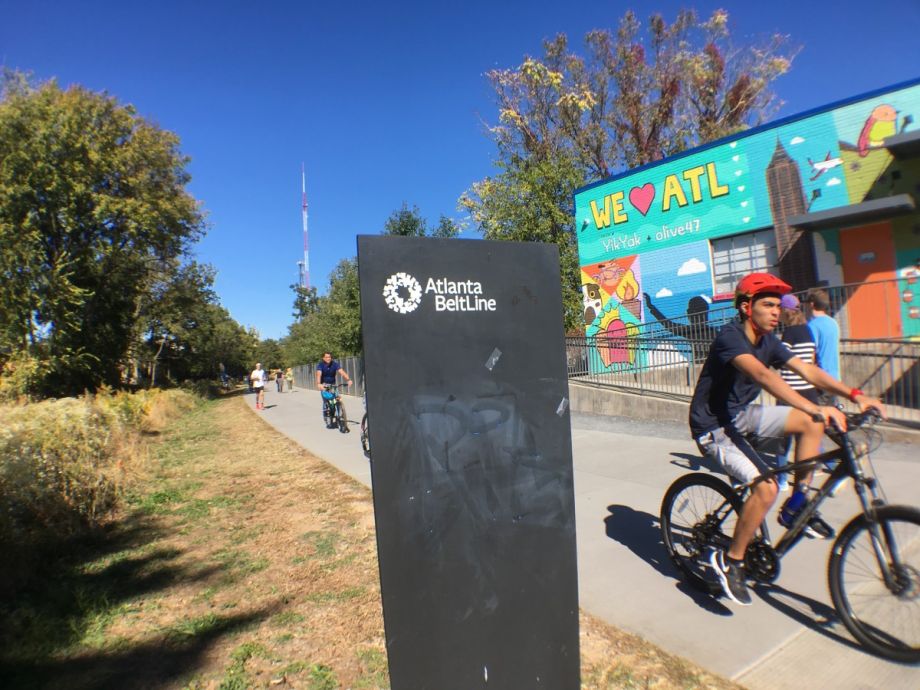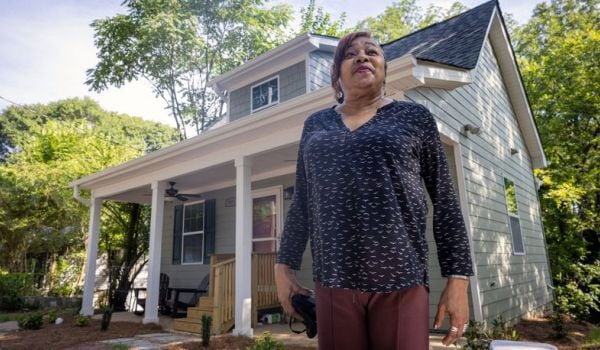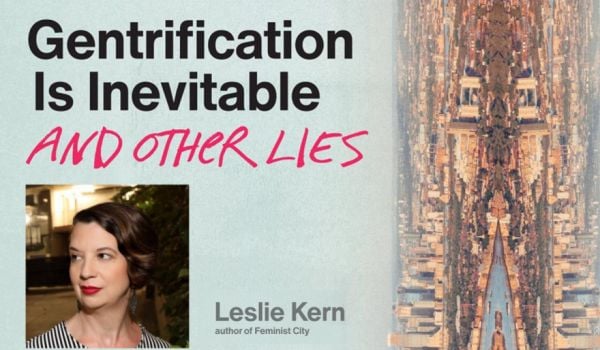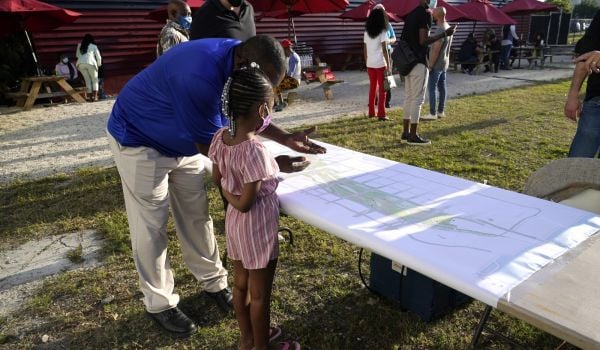The family of Edward Johnson, a longtime Atlanta resident who became the first black licensed master electrician in the city, had three properties to sell and plenty of would-be buyers approaching them. All three — a 1,300-square-foot bungalow in Mozley Park, a 1,500-square-foot home in Washington Park, and an undeveloped property adjacent to the Washington Park house — are close to Atlanta’s BeltLine.
In the end, the Johnson family realized they were in position to do something about the alarming situation around housing affordability along the BeltLine’s 22-mile circular route around Atlanta. Instead of selling them to a developer for the highest possible price, they sold them to the Georgia Trust for Historic Preservation, one of the country’s largest statewide non-profit preservation organizations.
In the wake of a 2017 investigation that found the Atlanta BeltLine hasn’t kept its affordable housing promises, the Georgia Trust is stepping in where the Atlanta BeltLine and its partners have failed so far. It’s a notable departure for the trust.
“We do work with affordable housing all the time, but houses in the rural part of Georgia have been mostly our focus,” says Mark C. McDonald, President and CEO of the trust. Across the state, Georgia Trust sells historic properties at affordable prices to residents as-is, or with minor improvements, then assists them in a preservation plan for the home. Sales are contingent on homeowners maintaining the historic nature of their property.
That dual focus — on affordability and preservation — brought them to the BeltLine. Georgia Trust Board Chair Bill Peard urged the organization to look to Atlanta. Alongside the city’s growing need for affordable housing, there have been a high number of teardowns of historic properties as neighborhoods gentrified.
“We were sitting back watching this happen. The changes to the historic districts of Atlanta and land speculation going on by wealthy Atlanta developers, and thinking it was a nightmare scenario of displacement and changing the character of neighborhoods,” McDonald says.
According to McDonald, when the trust sought organizations to partner with and provide financial support to bring their model to Atlanta, they came up empty handed. “There are a lot of organizations working to create the BeltLine, but very few working to provide affordable housing,” he says.
That issue was highlighted in last year’s investigation of Beltline leadership, which found that the organization was far from achieving its affordable housing goals and suggested the blame was at least partially internal. (The Beltline has just undergone a leadership change.)
McDonald says Georgia Trust met with the Atlanta BeltLine Inc., to discuss their plan and seek funding. The BeltLine was unable to provide funding to the project because it was outside their focus area.
According to a spokesperson with the BeltLine, legislation states that the organization can not direct its funding — which so far amounts to $12.5 million — outside a set tax increment financing district, where they have a legislatively-mandated goal of creating 5,600 affordable units. The Johnson Family’s properties, while close to the BeltLine, fall outside the district boundaries.
“While Atlanta BeltLine, Inc. is limited in the areas where we can expend funds for affordable housing, we are enthusiastic about Georgia Trust’s new program for homes near the Atlanta BeltLine,” Brian McGowan, the new President and CEO of Atlanta BeltLine, Inc., said via email.
A recent story by the Reporters Newspaper notes that while another tax district is in the works to speed up BeltLine construction, the legislation will not mandate affordable housing. “Atlanta BeltLine, Inc. and a BeltLine developer say enough affordable housing units will be built regardless and the tax district would not cause an increase in rent,” according to the report.
With no other funding sources coming through for the Georgia Trust, the group depended on their connection with the Johnsons for their purchase. A year prior to purchasing the family’s properties, one of the trust’s staff members had identified the family’s Washington Park property as a potential candidate for its affordable housing preservation program. In forging a relationship with the family, the trust explained how selling the properties to them would be different than selling to developers.
“[The Johnson Family] had similar goals to us and shared our vision,” McDonald says. “They had been approached by a lot of speculators and didn’t want to sell to them.”
In a city with rapidly rising housing costs, McDonald says that finding homeowners willing to sell at a lower rate is key. “You need to find sellers that share that value system [of preservation and affordability], because they could have sold these properties for much more,” he says. The Georgia Trust paid $100,000 for all three lots.
The trust will work with the Georgia Tech School of Architecture on rehabilitation plans that prioritize energy conservation for the two homes, and is in talks with Habitat for Humanity about potentially partnering to build a home on the empty lot. After construction wraps, each property will be made available as affordable housing through the trust’s Revolving Fund program, marketing to buyers who agree to preserve and maintain the structures, with protective covenants attached to the deeds. The trust’s goal is to offer each property for less than $200,000, while providing buyers down payment assistance through an organization such as Invest Atlanta.
Though the city is pushing affordability measures along the BeltLine like inclusionary zoning, providing opportunity for affordable homeownership remains a struggle.
“More resources are needed,” says George Burgan, Senior Director of Communications for Atlanta Neighborhood Development Partnership, Inc., a nonprofit that rehabs homes across the city for affordable homeownership. “Down payment resources are needed. Buying homes affordably to rehab is a challenge, then rehabbing can be very expensive,” he says.
Affordable housing advocates are hopeful, however, in Atlanta Mayor Keisha Lance Bottoms’ campaign promise of investing $1 billion of public and private money in affordable housing and anti-displacement measures. So far, the mayor announced a $9 million initiative to offer forgivable loans to homeowners to make critical upgrades to their houses.
As for the Georgia Trust, they see promise in repeating their model across the BeltLine — and encouraging other nonprofits to do the same. “We plan to use these properties for weekend tours and seminars to show … that this is economically feasible, and a good preservation practice,” McDonald says. With these first projects, the trust hopes to financially break even, not including staff time.
“We want to use these houses as a living laboratory, and invite the public in, which we hope will result in others using the same business model,” McDonald adds.

Emily Nonko is a social justice and solutions-oriented reporter based in Brooklyn, New York. She covers a range of topics for Next City, including arts and culture, housing, movement building and transit.
Follow Emily .(JavaScript must be enabled to view this email address)
















